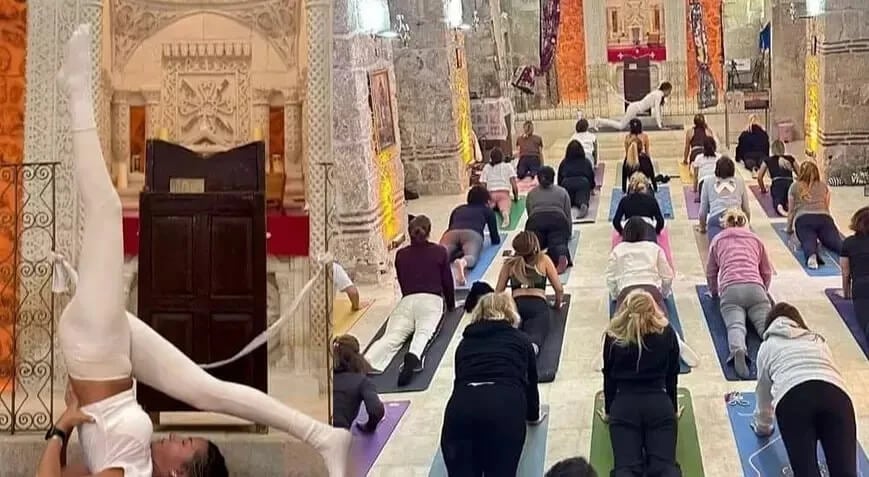A yoga session held inside a historic Syriac church in the southeastern Turkish province of Mardin has drawn criticism from the Syriac community in Turkey and abroad for being “an act of disrespect,” according to a report by the Armenian Agos weekly on Monday.
The event, organized by yoga instructor Seda Deliormanlı, took place at the Syriac Orthodox Church of Mor Yuhanon (St. John) in the Dereiçi (Killit) village in Mardin’s Savur district. Following the event, Deliormanlı shared photos of participants practicing yoga inside the church on social media.
The images quickly sparked backlash, with many accusing the organizers of disrespecting a sacred space.
“They came to Mardin’s Savur district, claiming it was a cultural tour and practiced yoga inside the Syriac church in Dereiçi. We condemn the participants of this disrespectful act. Sacred places should never be treated so thoughtlessly,” the Syriac Culture account said on the social media platform X.
Kültürel gezi diye geldikleri Mardin Savur ilçesindeki Kıllıt (Dereiçi) köyündeki Süryani kilisesinin içinde yoga yaptılar. Bu terbiyesizliği yapan insanları kınıyoruz. İnsanların kutsal saydıklarına bu kadar saygısızca davranılmamalı… pic.twitter.com/JVt7JMsKWU
— Süryani Kültürü (@suryanilercom) November 24, 2024
Gabriel Ağırman, a Syriac living in Sweden, shared his dismay with Agos, saying that the group’s decision to hold a yoga session in the church was “very disrespectful and insulting to Syriacs.”
“No religion’s place of worship should be subjected to such actions. We, as a community, defend freedom, but with that freedom comes responsibility. We oppose any abuse of worship spaces,” Ağırman added.
Ağırman also criticized the apology issued by Deliormanlı following the backlash, suggesting it did not adequately address the gravity of the situation.
The yoga instructor said in her apology that she would never have gone ahead with the “brief yoga session that was held after obtaining all the necessary permissions from the relevant authorities” if she had anticipated that even one person would be offended by it.
“I would never disrespect any belief, value or culture. … I hope you believe in the sincerity of the regret I feel for organizing this event in such a special and meaningful setting, with good intentions and inspired by places of worship abroad,” Deliormanlı said.
The church, recognized as a cultural heritage site by the Ministry of Culture and Tourism, is among the oldest in Turkey, boasting a history of more than 1,700 years.
Featuring two distinct rooms and worship spaces, as well as three tunnels in addition to the tombs of three priests, this historic and cultural landmark holds great significance for the Syriac Christian community, serving as both a sacred place of worship and a powerful symbol of their cultural identity.
A sizeable ethnic minority during the Ottoman era, the Assyrians suffered a mass slaughter in 1915 that some refer to as a genocide. Subsequently, they faced pogroms in the early days of the Republic of Turkey, after which some of them fled to neighboring Syria.
Despite being a predominantly Christian minority, the Assyrians were not granted minority status under the Treaty of Lausanne, a provision from which other non-Muslim groups benefited, namely Armenians, Jews and Greeks.
Modern Assyrians may culturally self-identify as Syriacs, Chaldeans, or Arameans for religious, geographic, and tribal identification. Their number in Turkey is currently estimated at 25,000. Most live in İstanbul, having fled their hometowns in the southeast of the country due to the Kurdish conflict.


